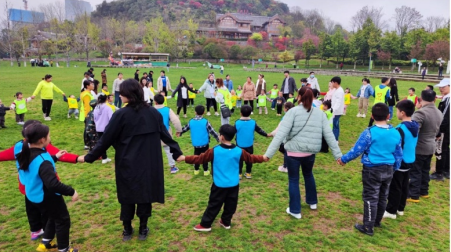来源: 2023-06-02 CGTN radio Social organizations connect migrant kids with new communities
An increasing number of children in China are migrating with their parents, often faced with challenges to adapt to new environments.
Social organizations have stepped up to help these kids integrate into their new communities and society.

Children took part in an activity held by a Center for Migrant Children. [Photo: Evergreen]
At a migrant children's center in suburban Tianjin, a group of volunteers and young mothers are singing and dancing with little kids.
It is a heart-warming sight, but these children face challenges despite being fortunate enough to live with their migrant parents, unlike their left-behind counterparts.
They still have to adapt to new surroundings, neighborhoods, and even a different dialect.
To help them integrate and feel at home, the center offers a variety of engaging activities, such as storytelling, toy making and city exploration.
Since many migrant children are often left unattended due to their parents' long working hours, safety education becomes a priority.
Taking charge of the migrant children's center in Tianjin is a migrant mother, Yi Jing.
"We provide safety courses for the community, covering topics like how to prevent drowning, fires, and burns. We also offer sex education for children. These courses help children understand the importance of safety and teach them how to stay safe in their everyday lives."
Yi is a member of the Evergreen Social Work Center, a non-profit organization that has set up over 70 Centers for Migrant Children in four Chinese provinces.
Experts and volunteers at the organization have noticed that migrant children often feel like they do not belong.
Yi Jing has seen firsthand how these children's centers can help these kids regain a sense of identity and belonging.
"There was a single-parent child who was initially afraid to come and take part in our activities. He could not blend in and was reluctant to talk to others. Then we encouraged him to teach other kids what he had learned, and after two years, he now loves this place and always comes by himself after school. I think he has developed trust in us and feels like he belongs here."
According to the national census conducted in 2020, out of the 300 million children in China under the age of 18, 71 million are migrant children who relocate with their families.
This means that one in four children in China is a migrant child.
Evergreen Founder Lin Yue says it is urgent to offer community support to help these migrant children feel connected to their new cities.
"Migrant children lack a social support system, and when they move to new cities, they lose the close connections they had in their hometowns. That is why it is important for us to make community efforts to connect them with others, including volunteers and other children, to help them form their own social network."
Since its registration in 2012, Evergreen has been providing services to about 400,000 children each year.
It also works with the government, corporations, and foundations to secure financial support and promote its activities.
Tao Chuanjin is an expert on non-profit organizations at Beijing Normal University.
He highlights the importance of having a dedicated space where migrant children can connect with their new environment, and non-profit organizations are uniquely positioned to create such spaces.
"Public welfare organizations have a long-standing tradition of advocating for social causes. They have charitable funds, noble ideals, practical actions, and lofty goals. They are committed to using their resources to the fullest extent, and they can always make things happen."
Although the efforts of social organizations have been effective, Tao expects that there will be top-down initiatives to provide community services for migrant children nationwide.
